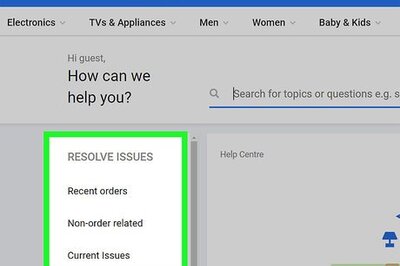
views
Gaining Experience

Earn at least a high school diploma. Concierge jobs generally do not require a college degree. The minimum requirement for most positions is a high school diploma. An associate's or bachelor's degree in tourism, hospitality, or hotel management may be helpful for better paying jobs. Some community colleges may offer a certificate in hospitality. This takes less time than an associate's degree, but it still looks good on a resume.

Take a tourism or hospitality course. If you want to improve your knowledge of the tourism industry, check local universities and community colleges for classes in hospitality or hotel management. You may even be able to take an online course. National organizations, like the National Association of Professional Organizers or Les Clefs d'Ors, may also offer courses.

Experience your community like a tourist would. To offer your guests honest advice, you will need to know about all of the amenities and services your local area offers. Eat at various restaurants, and visit local attractions. Repeat this every six to twelve months after you get a job, so that you understand what's trendy and new. You should research local: Restaurants. Museums. Spas. Gyms. Grocery stores. Parks. Theaters. Shopping.

Find work within the hospitality or tourism sector. If you do not have any experience in tourism, you may want to find a part-time job in other service sectors. This will give you some experience that may help when applying to be a concierge. Some jobs that may be relevant include: Hotel receptionist. Tour guide. Valet. Personal assistant. Hotel or restaurant manager.
Applying for a Job

Tailor your resume to the job description. Write your resume specifically for the job of concierge. To do this, read over concierge job descriptions, and make your experience fit the requirements. Emphasize strong skills in communication, multitasking, and time management. On your resume, highlight any experience in tourism, customer service, or management. If you speak another language, make sure you indicate how fluent you are. You might indicate if you are a native speaker, completely fluent, or just conversational.

Apply for jobs at hotels and other service corporations. Most concierges work at hotels, although jobs will occasionally appear at travel agencies, office buildings, apartment buildings, and cruise ships. You may even find job listings for private clients. You can look for these jobs both on specialized hotel or tourism job boards or on general career websites, like Monster or Indeed.

Ace the interview. The interview is a great opportunity for you to demonstrate your strong communication and interpersonal skills. The interviewer may ask questions about your previous experience in tourism, ability to interact with guests, and problem solving skills. Some potential interview questions include: How would you handle a difficult or angry guest? You might give an example of how you handled such guests, customers, or clients in the past. Emphasize how calm and rational you were in the situation. Have you ever had any unusual requests in the past? How did you respond? Choose a story where you solved the problem to everyone's satisfaction. If you have no experience in hotels, you might talk about when a coworker, boss, or friend asked for something difficult. What tours, restaurants, or activities would you recommend in this area? Pretend the recruiter is a guest in this situation. Give them at least three good recommendations. Can you work nights and weekends? Be honest with this question, as the recruiters may be looking for someone to fill specific hours.
Performing the Job Well

Greet people as they enter the building. Concierges typically work in the reception or lobby of a building. You should welcome guests as they enter in a friendly and upbeat manner. If it looks as if they need help with anything, offer your services. You can say, "Welcome to our hotel! Is there anything I can assist you with?"

Prepare to answer any question guests might have. It is your job to make sure that any questions that a guest has can be answered. While most people will ask for local recommendations, be prepared to answer almost anything. Common questions include: “Where is a good place to eat?” “Where can I exercise or run?” “What activities are good to do with children?” “Where can I do laundry?" More unusual questions might include: “Where can I watch international sports games?” "Is it possible to get a private viewing of the museum?" "Can you get us backstage passes to a concert?" If you are ever asked to do something illegal or immoral, respond politely, “I'm sorry, but I cannot arrange that for you.”

Fulfill requests as asked. Concierges may be asked to run errands for guests, or they may need to fill in at the reception desk occasionally. Be prepared to do whatever task is asked of you. Some common requests that you might encounter include: Calling a cab for guests. Ordering or picking up food to be sent up to guests' rooms. Making airline or car rental reservations. Picking up flowers, balloons, or other celebratory items. Buying theater or event tickets.

Ask the guests questions to learn what they want. Every guest is different. When your guest requests a recommendation, ask them questions about what types of food, atmosphere, experience, and activities they enjoy. For example, if you are asked for a restaurant recommendation, ask the guest, “What type of food are you in the mood for? Will there be children coming? Are you interested in live music while you eat?” If they ask you for an activity recommendation, you might ask, “Do you want to be outdoors or inside? Do you enjoy cultural activities like art and theater? How much do you want to spend?"

Get certification if you want to qualify for higher paid jobs. Once you have your first job, you can apply for certification. While not required for most jobs, higher paid positions at four or five star hotels may only be open to certified concierges. Certifying organizations include the Les Clefs d'Or and the National Concierge Association. While it varies from organization to organization, certification usually involves completing a course and taking an exam. Some organizations, such as the Society of the Golden Keys, require you to be sponsored by an already certified member.

















Comments
0 comment